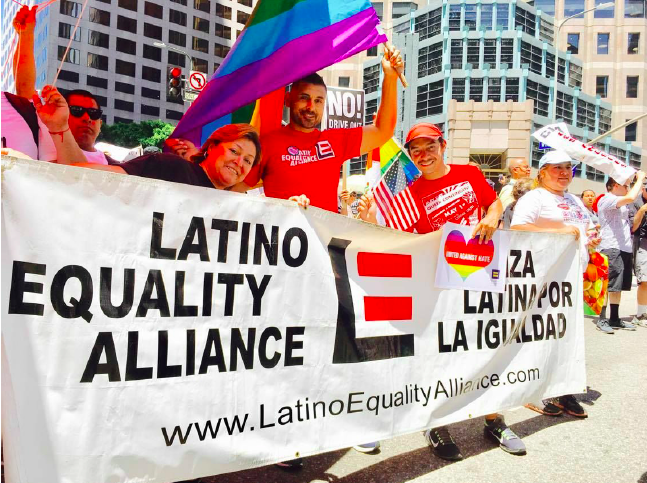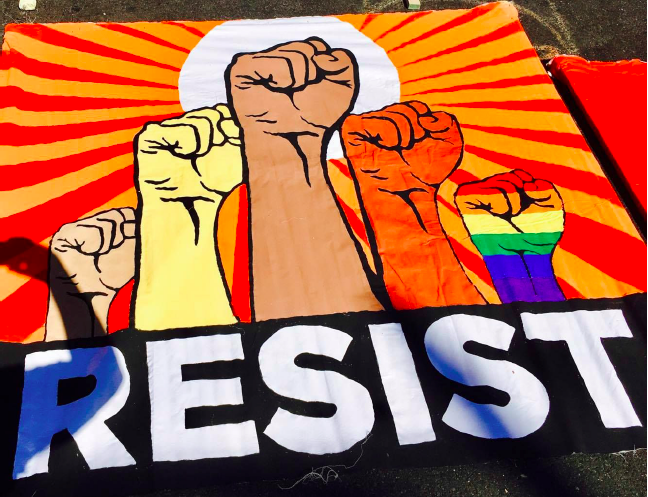May Day is an annual celebration and recognition of workers’ rights that occurs around the world on May 1st. It also pays respect to the struggles of different minority groups, which includes an LGBTQ+ rally and meet-up. I attended the event for the first time this year and had the pleasure of interviewing Ari Gutierrez, who serves as the co-founder and advisory board president of the Latino Equality Alliance. In her interview, she provides insightful background about May Day’s origins and importance, as well as information about her own organization.
May 1, 2017
Ari Gutierrez, Co-Founder and Advisory Board President
Latino Equality Alliance (www.LatinoEqualityAlliance.org)
1) What is May Day? How long have queer orgs, including your own, been participating? Is there a separate event for LGBTQ+ people or are all minority groups marching together?
May Day, observed on May 1, is an annual international commemoration of worker’s rights with roots in the 1886 labor union strike for the 8-hour work day. In the United States, labor organizations have traditionally taken a lead role in organizing visibility events throughout the country. In major cities like Los Angeles the rank and file of service unions are people of color including Latinos who are immigrants. As such, immigration advocacy has become a central advocacy issue for May Day marches.
In 2006, response to impending draconian national immigration policy manifested in the largest May Day march in Los Angeles with over 500,000 participants. Like then, the current political climate threatens the safety and dignity of immigrants and has manifested in unfair and unpredictable U.S. immigration policy against which we are all called to RESIST, which is the theme of this year’s march.
Queer groups have visibly participated since about 2007. A larger and organized queer contingent began in 2009, after the 2008 Proposition 8 ballot initiative that took away marriage rights from same-gender couples. This was the first year of the Latino Equality Alliance (LEA) and we were joined by other mainstream LGBT groups including Equality California, The LGBT National Task Force and local Latino groups including the Bienestar Human Services. Over several years, the queer contingent became the largest and most visible in the march due to the organized community outreach, the predominant rainbow flags and the new interest by mainstream LGBT organizations in supporting issues that are important to the Latino LGBT community, which LEA represents.
For years, despite our LGBT visibility in supporting labor and employment policy, there was still a separation of issues and, while there was support at the top, LGBT issues did not manifest in the promotion and presentation of the issues within the May Day march itself. LGBT groups felt disenfranchised and marginalized within their own community and in 2016 boycotted the main march and had their own advocacy event.
This year, in light of the across the board assault by the Trump Administration on social justice issues, the organizers of the May Day march have made an intentional effort to be inclusive and recognize the intersections of our social justice advocacy. As such, Transgender, LGBT, women’s and racial justice issues are an intentional part of the event promotion, media materials, speakers and inclusivity is a central theme in all organizing efforts.
2) What other queer orgs do you work with, specifically for May Day?
This year, LGBTQ organizations participating in the May Day march include: Latino Equality Alliance, Stonewall Democratic Club, Los Angeles LGBT Center, Lambda Legal, Equality California, Human Rights Campaign and others have formally pledged support and are organizing to participate.
3) What is your background with Latino Equity Alliance and Mi Centro (how long have you been working here)? And what does the organization do/is there a mission statement?
I am a co-founder of the Latino Equality Alliance (LEA) and serve as the Advisory Board President in a volunteer capacity. LEA was established in response to the ballot initiative, which through voter approval, removed rights from same-gender couples.
Our grassroots founders felt there was an opportunity to address LGBTQ issues within our Latino community in ways that met folks where they were in acceptance and provided opportunities to move community support from the minority to a majority. Further, reducing homophobia in the community is a prevention measure against its negative effects including ostracizing and family separation, peer and family abuse, homelessness, high risk sexual behavior that leads to economic hardship and severe health issues including HIV/AIDS.
As a non-profit organization, LEA’s goals and mission are to increase support for LGBT issues in Latino communities. We do this through a collaborative approach working with LGBT and Latino organizations to provide forums, workshops and public awareness campaigns that increase understanding and acceptance of LGBTQ people and issues in our Latino communities.
Mi Centro is our community LGBT center based in Boyle Heights to serve the community East and South Los Angeles. It is a collaboration between the Latino Equality Alliance and the Los Angeles LGBT Center.

4) Why is it important to march and organize? How does May Day create visibility?
Primarily, May Day is a show of solidarity for social justice and human rights and reflects the core of our LGBTQ movement. For the Queer community, this is an opportunity to highlight that the LGBTQ community is part of the labor and immigrant community and these issues are important to us too. This is a point important to emphasize to the labor and immigrant movements as much as it is a message the LGBT community.
May Day is also a critical opportunity to show up for our own community and create visibility of our Latinx LGBTQ community and issues because we understand that we cannot “win” on our issues without the support of the labor, immigrant and other social justice advocates.
WE march together — in solidarity — because we understand that organizing and joining forces in our advocacy is the way towards equality, equity and social justice!

